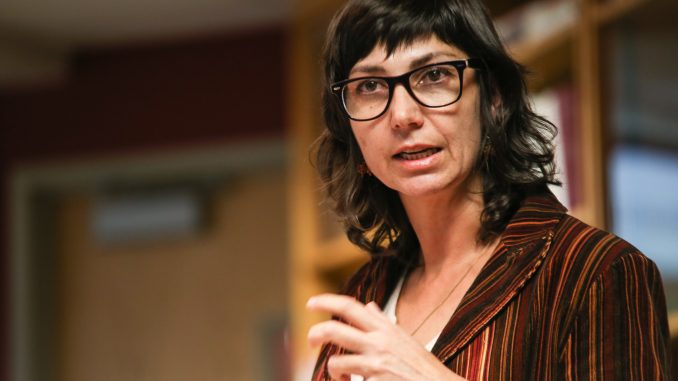
For Alexa Firat, graffiti is more than what meets the eye.
While some consider it art and others consider it vandalism, Firat believes graffiti is the language of cultures across the world.
As an assistant professor in the department of Asian and Middle Eastern languages and studies, Firat presented the final event in the series of noon-hour talks hosted by the department. She connected the role of graffiti and street art with the public discourse in the Arab uprisings since 2011.
Firat’s presentation, “Graffiti and the Current Arab Uprisings: Street Talk or Talk of the Street?” took place at noon on Oct. 8 in Anderson Hall. It presented images of artwork highlighting what she called a language expressed through art in the Arab-speaking world.
“People are using public space basically to have a discussion with themselves, their fellow demonstrators and with the new or old regimes,” Firat said.
In the presentation, images of graffiti and public displays of street art in Arabic-speaking countries were shown along with a discussion of how the artist’s work expressed a certain communication in the community’s upheavals.
Firat said she chose the topic to recognize graffiti as a language expressing ideas to a community rather than what many people view as secret communication intended to be hidden.
“Rather than people thinking it’s a type of slang, or something cryptic like gang talk or a private conversation, it’s not –it’s a very public conversation,” Firat said. “It’s the talk of the street. It’s what the street is saying and actually talking about.”
She discussed the history of what is known as the “Arab Spring” and the way graffiti artists are average people fighting for a chance to express beliefs to the community.
“I wanted to talk about the uprisings and revolutions in these regions in terms of artistic expressions that have been so visually rich,” Firat said. “They have been created by everyday people and not necessarily by anyone official. This discourse has been made by people who have risked their lives, livelihoods and put their time and bodies out into the public to talk to their governments and to each other. This public conversation has been happening on the walls and streets where people have been coming together for these revolutions.”
Images of street artists and their work from Arab-speaking countries like Tunisia, Bahrain, Egypt and others were showcased at the lecture, along with a brief video specifically about graffiti in Syria and how some people are using it to respond to ISIS.
Arabic instructor Nesrine Chahine, who began teaching at Temple this year, said Firat’s presentation was a great way to expand classroom discussions and touch on aspects that are not usually covered in class.
“I think it’s great, because it gives students a chance to think about the language in a very real context,” Chahine said. “Often we don’t have time for those conversations in class, because we’re so focused on acquiring the blocks of the language that all these huge cultural and political issues get swept to the side. I think it’s really important for students to have some space to be exposed to that and interact with it.”
 Chahine hopes to connect the culturally diverse student body of Temple and the urban area of Philadelphia with the popularity of street art as a form of political and social expression.
Chahine hopes to connect the culturally diverse student body of Temple and the urban area of Philadelphia with the popularity of street art as a form of political and social expression.
“That’s what is so great about graffiti, it literally speaks to you on a visual scale even if you don’t necessarily know all of the context,” she said. “It’s something we see all the time, just look at Philly and all of the graffiti that speaks to us.”
The College of Liberal Arts presented the series of three talks as an opportunity to not only further discuss issues briefly covered in these courses, but to celebrate the recent name change from the department of critical languages to the department of Asian & Middle Eastern languages and studies.
“The new name better communicates our department’s academic programs in Arabic, Chinese, Japanese, Hebrew, Korean and Hindu,” said Associate Professor and Department Chair Barbara Thornbury.
“Critical languages is sort of an outdated term,” she added. “There still are critical languages departments, but it was used to encourage students in universities to study languages in places where the U.S. has a national interest for people to know more about the languages. ‘Critical languages’ doesn’t really tell you anything. The new name better focuses on the context of our courses.”
Professor Firat said she saw her discussion as an opportunity to discuss important information in a visual way that time doesn’t always allow in the classroom.
“I’m hoping this will get students to understand the kinds of things we teach here in our department,” Firat said. “People often think it’s just a language department, but we also teach a lot about culture. There are professors who teach Chinese literature, Japanese folklore, all kinds of culture based films and some even use ancient texts. It’s language for students to use, but it’s also culture, literature, cultural productions and so much more.”
Firat said she was pleased to close the series of talks and celebrate the name change.
“Hopefully it will get people excited about what we do and get more students in our department taking our classes and putting our name out there, giving us an identity rather than just a language department,” Firat said.
Alexa Zizzi can be reached at alexa.zizzi@temple.edu



Be the first to comment